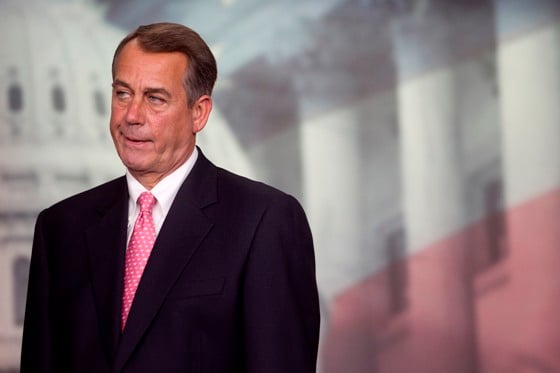House Republicans will pitch a temporary fix for a student loan rate set to double to 6.8% July 1 by combining it with a highway spending bill
U.S. House Republican leaders plan to combine a multiyear highway bill with a one-year freeze for government subsidized student loan rates, Speaker John Boehner told reporters today.
“We are moving, I think, towards an agreement on a transportation bill that will also include a one-year fix on the student loan rate” that otherwise would double on July 1, Boehner, an Ohio Republican, said in Washington today.
The highway measure will reduce the number of projects funded and “streamline the regulatory process,” Boehner said. He said the measure allows “us to focus our highway dollars on fixing America's highways, not planting more flowers around the country.”
John Mica, a Florida Republican and chairman of the House Transportation and Infrastructure Committee, said his goal is to file the highway bill by tonight.
In addition to the highway measure and the student loan rate freeze, the bill the House will file probably will include a measure to reauthorize the National Flood Insurance Program, a Senate Democratic aide said today.
Senate consideration of the measure extending flood insurance programs through 2016 has been slowed because Senator Rand Paul, a Kentucky Republican, is insisting on a vote on an unrelated proposal specifying that human life begins at conception.
Flood insurance programs expire at the end of July.
Student Loans
Representative James Lankford, an Oklahoma Republican who sits on the Transportation panel, said today that he couldn't see a situation in which House leaders would separate student loans from the highway measure. Still, to gain support from Republicans, the measure must be finished in time for lawmakers to review.
“We have to get everybody the final text. We've talked generalities of all the things, but we got to get all the specifics,” Lankford told reporters.
Unless Congress acts, student loan interest rates will double to 6.8 percent on July 1. Current funding for highway programs expires at the end of June.
Mica said the elements under his panel's jurisdiction are settled, including streamlining environmental reviews.
“Loose ends are being tied together,” Mica said. “The outstanding items, we are ticking them off one at a time.”
House Republican leaders told members to “be prepared to vote” this week on a highway measure, Oklahoma Representative Tom Cole said as he left the caucus.
'Good Deal'
Cole said Boehner “has always been anxious to get a good deal” and won't ask the House to vote on something without “serious reforms in it.”
Senate leaders said yesterday they had reached tentative agreement on how to cover the cost of the one-year student loan interest rate freeze, cautioning that the agreement hinged on the success of highway bill negotiations with the House.
“We're very close to having everything done, but until we get everything done, nothing is done,” Majority Leader Harry Reid told reporters yesterday. The agreement would include three offsets, which would cover the $5.9 billion cost of the student loan rate freeze and also may help pay for the highway bill, said Senate Republican and Democratic aides, who requested anonymity to discuss the non-public agreement.
Higher Fees
They are higher fees payable to the Pension Benefit Guaranty Corp., changes to corporate pension funding requirements to reduce payments and increase taxable income, and a six-year limit on loan subsidies for part-time students.
Senate Minority Leader Mitch McConnell, a Kentucky Republican, told reporters yesterday he and Reid had reached “an understanding” on a student loan proposal that “may or may not be coupled” with the highway bill.
The Senate on March 14 passed a two-year, $109 billion highway bill by a vote of 74-22. The House has been unable to pass a multi-year highway bill, instead opting jump straight to negotiations with the Senate over a compromise measure.
The Highway Trust Fund, which enables the federal government to pay for state road, bridge and mass transit projects, may run out of money if Congress can't agree on long- term legislation and resorts, as it has nine times already, to a temporary extension of current law.
Gas Tax
Without a long-term bill or extension, U.S. authority to collect the 18.4-cents-a-gallon gasoline tax and spend on highways and transit will run out June 30, cutting off money to states for programs funded by the Highway Trust Fund such as safety and repairs. Thousands of construction and government workers probably would be idled.
Lawmakers were pushing for a measure that extends highway funding through September 2013, Representative Bill Shuster, a Pennsylvania Republican, said yesterday. That's about the time frame of the measure the Senate passed in March. After efforts to pass a long-term bill fell apart, the House passed an extension of current law April 18 to push discussions to a conference committee.
“We've got to wait and see what the money is,” Shuster said as talks continued. “The money is going to be the thing that drives that.”
--Bloomberg News--







